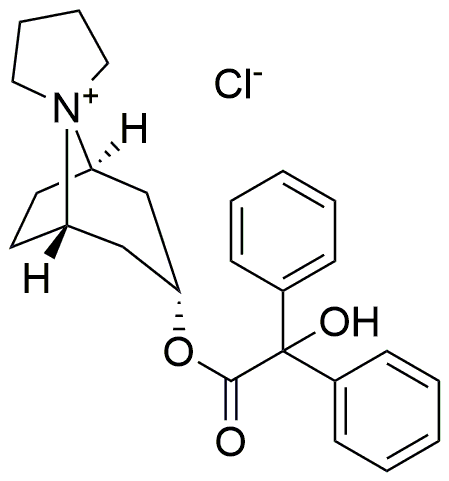Trospium chloride is widely utilized in research focused on
- Urology: This compound is primarily used to treat overactive bladder symptoms, providing relief for patients by reducing urinary urgency and frequency.
- Pharmaceutical Development: Trospium chloride serves as a model compound in drug formulation studies, helping researchers understand the pharmacokinetics and pharmacodynamics of anticholinergic medications.
- Clinical Trials: It is often a subject in clinical trials aimed at evaluating new therapies for bladder control issues, allowing researchers to compare efficacy and safety profiles against other treatments.
- Research on Anticholinergic Effects: This chemical is used in studies investigating the broader effects of anticholinergic agents on cognitive function, particularly in elderly populations.
- Combination Therapies: Trospium chloride is explored in combination with other medications to enhance therapeutic outcomes in managing urinary disorders, offering a more comprehensive approach to treatment.
General Information
Properties
Safety and Regulations
Applications
Trospium chloride is widely utilized in research focused on
- Urology: This compound is primarily used to treat overactive bladder symptoms, providing relief for patients by reducing urinary urgency and frequency.
- Pharmaceutical Development: Trospium chloride serves as a model compound in drug formulation studies, helping researchers understand the pharmacokinetics and pharmacodynamics of anticholinergic medications.
- Clinical Trials: It is often a subject in clinical trials aimed at evaluating new therapies for bladder control issues, allowing researchers to compare efficacy and safety profiles against other treatments.
- Research on Anticholinergic Effects: This chemical is used in studies investigating the broader effects of anticholinergic agents on cognitive function, particularly in elderly populations.
- Combination Therapies: Trospium chloride is explored in combination with other medications to enhance therapeutic outcomes in managing urinary disorders, offering a more comprehensive approach to treatment.
Documents
Safety Data Sheets (SDS)
The SDS provides comprehensive safety information on handling, storage, and disposal of the product.
Product Specification (PS)
The PS provides a comprehensive breakdown of the product’s properties, including chemical composition, physical state, purity, and storage requirements. It also details acceptable quality ranges and the product's intended applications.
Certificates of Analysis (COA)
Search for Certificates of Analysis (COA) by entering the products Lot Number. Lot and Batch Numbers can be found on a product’s label following the words ‘Lot’ or ‘Batch’.
Numéro de catalogue
Numéro de lot/série
Certificates Of Origin (COO)
This COO confirms the country where the product was manufactured, and also details the materials and components used in it and whether it is derived from natural, synthetic, or other specific sources. This certificate may be required for customs, trade, and regulatory compliance.
Numéro de catalogue
Numéro de lot/série
Safety Data Sheets (SDS)
The SDS provides comprehensive safety information on handling, storage, and disposal of the product.
DownloadProduct Specification (PS)
The PS provides a comprehensive breakdown of the product’s properties, including chemical composition, physical state, purity, and storage requirements. It also details acceptable quality ranges and the product's intended applications.
DownloadCertificates of Analysis (COA)
Search for Certificates of Analysis (COA) by entering the products Lot Number. Lot and Batch Numbers can be found on a product’s label following the words ‘Lot’ or ‘Batch’.
Numéro de catalogue
Numéro de lot/série
Certificates Of Origin (COO)
This COO confirms the country where the product was manufactured, and also details the materials and components used in it and whether it is derived from natural, synthetic, or other specific sources. This certificate may be required for customs, trade, and regulatory compliance.


